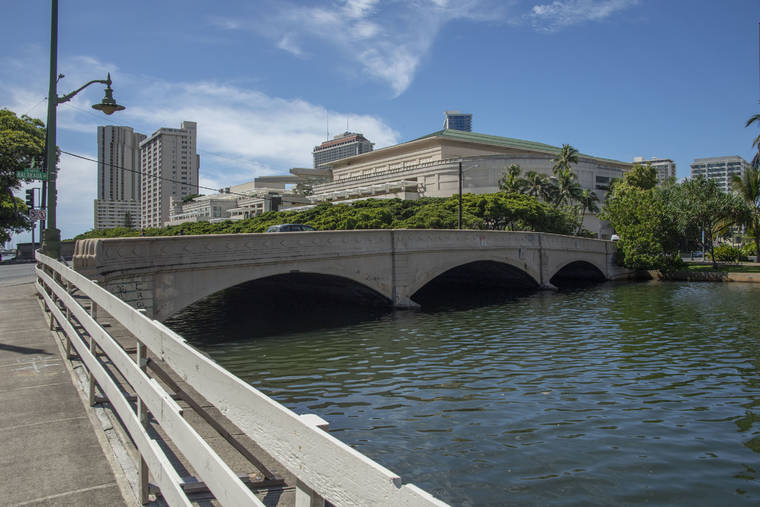The nonprofit Protect Our Ala Wai Watersheds went to court Monday to stop the city and and state from “prematurely obligating public funds” for a controversial flood control project that would build walls and berms around the Ala Wai Canal and put huge flood-control structures in the upper reaches of the watershed.
Judge Jeffrey Crabtree, senior Environmental Court judge for the 1st
Circuit, began hearing the group’s motion for a preliminary injunction Monday morning. Testimony
is slated to resume at
8:30 a.m. today in Crabtree’s courtroom on the fifth floor of the Honolulu District Court building. However, Crabtree’s decision is not expected for about another week.
The hearing follows a Sept. 30 Crabtree ruling that denied the nonprofit’s request for a temporary
restraining order. Crabtree said irreparable harm
did not appear imminent. However, he acknowledged that “this may change within four to six weeks based on the certificate
of participation-to-escrow process, which is being planned to fund the project.”
The federal government has offered to pay
$220 million of a $345 million Army Corps of Engineers project.The city and state signed a memorandum of agreement, effective Sept. 19, committing the state to pay the project’s $125 million cost share by Nov. 30 and
the city to maintain the project. Leaders from the state Department of Budget and Finance testified Monday that the state planned to raise the money by selling certificate of participation (COP) bonds, which don’t require legislative approval like general obligation bonds.
David Frankel, attorney for the plaintiffs, argued that using COP bonds is questionable because the Legislature earlier this year refused Gov. David Ige’s request for project funds. Frankel also is questioning why the plan is being funded when neither a city nor a state agency has accepted the project’s environmental impact statement.
Frankel said the state
already has used state funds and state resources to sell COP bonds and has agreed to pay bond counsel $150,000 to implement the project’s funding process. And, Frankel said, that’s without knowing what the impacts of the project are to Ala Wai views, historic properties, six streams in the watershed and taro loi.
“State and city officials rushed to prematurely obligate state and city funding,” he said. “They leapt before they looked.”
However, Mayor Kirk Caldwell has told the corps that he only plans to sign a project participation agreement once state funds become available. And, he has said that the timeline could be altered by the lawsuit or permitting requirements.
Deputy Attorney General David Day told the court that the “single most important fact in the case” is the caveat that if a final EIS is not accepted by Nov. 30,
or if it is determined that
a supplemental EIS is
required, that the money will be held in escrow.
“How will plaintiff be
irreparably harmed if the Department of Budget and Finance sells the COPs, raises the funds and only
releases them after the
EIS process is completed?” Day asked. “When listening to the evidence, this court should focus on the money.”
During the hearing, Moana Yost, the city’s deputy corporation counsel, also argued that delaying or stopping the project would bring its own harms.
“Current studies show that without a flood control project at the watershed,
a major flood event could
affect approximately
65,000 residents and
200,000 visitors in Waikiki
on any given day,” she said. “Current modeling indicates that a 100-year event would result in damage to more than 6,000 structures with approximately $1.14 billion in structural damage and damage to critical infrastructure.”

